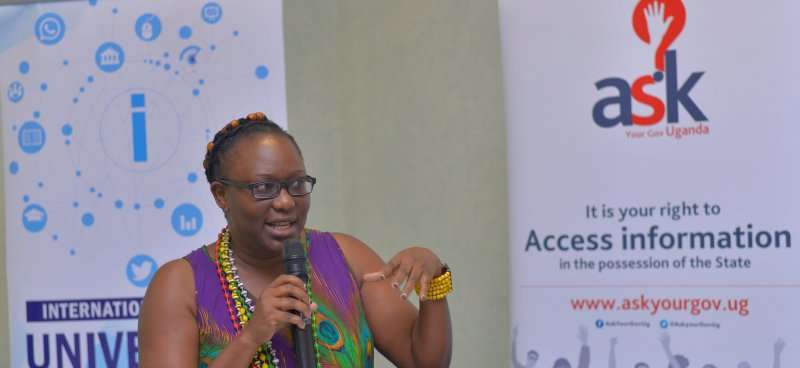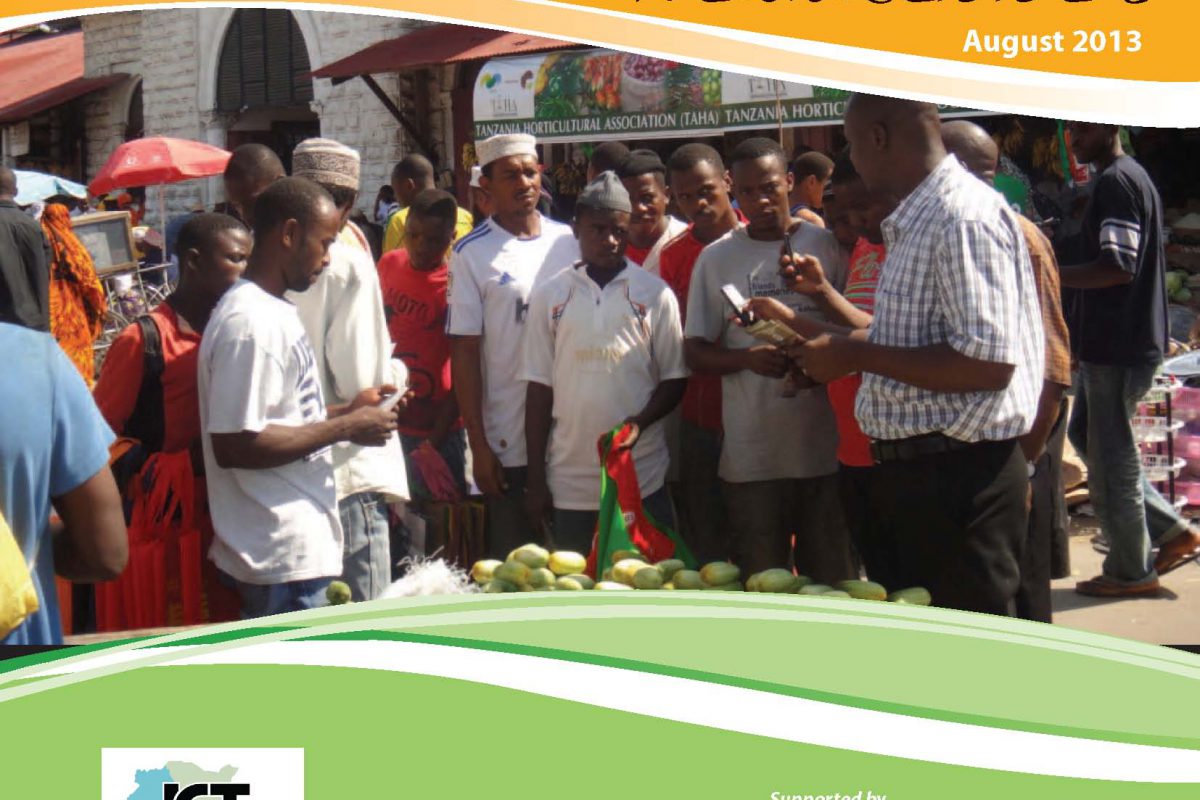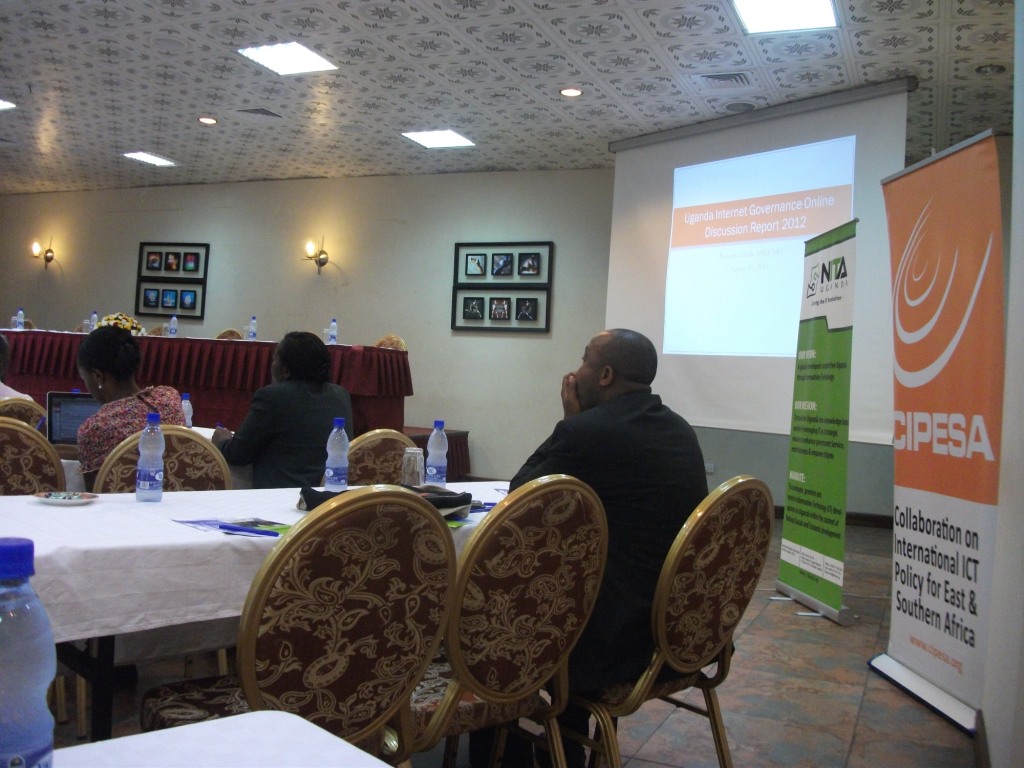By Loyce Kyogabirwe |
Norah Owaraga, a Ugandan researcher, recently narrated her experience on accessing government-held information in the country. She recounted a trip to Tororo district in eastern Uganda where she sought information on Tuberculosis prevalence in prisons. “I was told to go back to the prisons headquarters in Kampala (the capital) to get authorisation yet I had already received clearance from Uganda National Council for Science and Technology (UNCST) and the President’s Office to access government information. Why did I have to travel back to Kampala when I had all the clearance?” asked Owaraga.
Her question was directed at Frank Baine, the spokesperson of Uganda Prisons, during a dialogue held in Kampala to commemorate the International Day for Universal Access to Information, which falls on September 28.
In his response, Baine quoted section 4.8.1(i) of the Code of Conduct and Ethics for Uganda Public Service, 2006 and the Official Secrets Act 1964, stating that public officials are custodians of information that comes into their possession during the course of duty. “Without due permission from an authorising officer, such information cannot be communicated,” explained Baine. In Owaraga’s case, he said the authorising officer was not within the UNCST or the President’s office. Rather, it was the head of Uganda Prisons who had the mandate to authorise the release of the information.
Owaraga’s experience mirrors the challenges faced by Ugandan citizens in realising the right to access information. The right of access to information is enshrined in article 41 of the Constitution of the Republic of Uganda, 1995 which provides that, “Every citizen has a right of access to information in the possession of the state or any other organ of the state except where the release of the information is likely to interfere with the security of the state or the right to the privacy of any other person”. Uganda was among the first African countries to enact a right to information law, the Access to Information Act (ATIA), 2005 and later the Access to Information Regulations, 2011.
The ATIA is aimed at promoting transparency and accountability in all organs of the state by providing the public with timely, accessible and accurate information. Baine’s response instead highlights that a culture of secrecy still persists, with limited proactive release of information by public agencies and denial of citizens’ requests for information.
Other challenges that were raised during the dialogue include the high costs of accessing information, lack of knowledge of the provisions of ATIA among citizens and public officials, and the tedious procedures of requesting for information – all of which impact on the level of citizens’ information requests.
Despite the challenges, the government has taken some steps to promote access to public information. Speaking at the dialogue, Moses Watasa, Commissioner of Information Dissemination at the Ministry of ICT and National Guidance, explained that the Ministry is working to sensitise all government ministries, departments and agencies (MDAs) on ATIA as well as strengthening communication departments within MDAs and local governments with the aim of improving information gathering and dissemination.
Furthermore, the ministry has developed a centralised government information web portal (www.gov.go.ug), which functions as a gateway to all other government websites. The portal is reinforced by the ministry’s requirement for all MDAs to have a communications officer, functional website, a presence on social media and email addresses for officials to ensure public accessibility.
Watasa acknowledged that there has been a culture of secrecy among public officials further compounded by internal bureaucracies. He stated that the government was working to review archaic guidelines that restrict responsiveness or proactive disclosure by public officers.
Meanwhile, according to Watasa the government is also due to launch Open Government Sessions aimed at bridging the information gap between citizens and duty bearers. The sessions, which will be hosted monthly, will involve different MDAs interfacing with the public on functions, ongoing activities, budget allocations and expenditure and feedback. It is expected that the sessions will be broadcast live on TV and leverage social media platforms to allow remote participation.
However, it remains unclear when the archaic laws and guidelines will be reviewed and implemented to ease citizens’ access of public information. It is only through improved access to information that there can be increased social accountability and government transparency towards improved service delivery and greater citizen participation in governance and democratic processes.
The dialogue on access to information in Uganda was organised by the Collaboration on International ICT Policy for East and Southern Africa (CIPESA) in partnership with the Ministry of ICT and National Guidance in the context of the ICT4Democracy in East Africa initiative’s objective to engage stakeholders on supportive policies and practices for human rights and democratic governance in East Africa. It brought together 50 participants including public officials, policy makers, civil society, media, and scholars to reflect on the role of information in improving service delivery and accountability in Uganda.
ICT4Democracy in East Africa Newsletter August 2013
The ICT4Democracy in East Africa Network recognises that Information and Communication Technology (ICT) has the potential to increase citizens’ participation in decision-making processes, thus strengthening democratisation.
In this issue of the newsletter:
- The Tanzania Commission For Human Rights Takes SMS to The Citizens
- Motivators And Hindrances to Use of ICTs in Citizen Participation in Uganda
- M-Governance: Water Stakeholders Information Ecosystem in Kenya
- ICT4Health Service Delivery in Northern Uganda
- Are ICTs Promoting Social Responsibility? Ushahidi Platform Helps a Patient Get Medical Care
- Fostering Community Empowerment Through ICTs For Service Delivery And Community Participation.
Download the newsletter here.
ICTs and Governance: Learning Through Interactions
Understanding precisely what role Information and Communication Technologies (ICTs) play in governance, and how, is very important to our work. Over the past 18 months, we have interacted with organizations at country, regional, and international levels that utilize and promote the use of ICTs in governance. These interactions have served as a learning opportunity for us, since the use of new technologies in governance processes in developing countries is not one with a long (recorded) history. But while these interactions have helped us to understand better how ICTs can have a good chance of delivering positive outcomes in –governance—and in many other areas—they have also helped us to share knowledge and resources with diverse actors.
And while our own understanding of the role of ICTs in service delivery, in encouraging participation, and in promoting governance is steadily changing, we have noticed that the way different stakeholders view this role differs rather widely. There are various facets to the matter. Some look at it from the access and affordability angle; others from the utility side (value and functions of ICTs). There are also cultural issues, which in some instances hinder the use of ICTs by women, and which many—particularly at the grassroots level – are eager to point out. A related one is the low level of literacy generally and in particular about using ICTs.
Not forgotten are social issues, such as who influences use of a technology in a community, or the use of technology for personal benefit versus use for community benefit. Here, from various interactions, it seems that where individuals will have direct, tangible, personal benefits from using a technology, they will be more likely to use it – which explains why in Uganda there are 8.9 million mobile money users, or ardent Facebookers, as well as thousands that read newspapers online, and many others that do online sports betting, but then the numbers for those engaging in online civic/ political actions remain low.
In many countries, ICTs are presenting a number of opportunities and alternatives in the delivery of services from both public and private sectors. The value delivered over these technologies is growing, especially in terms of efficiency and effectiveness. Because of these capabilities, the demand for transparency and accountability through the use of ICTs is increasing.
As part of its iParticipate Uganda project, CIPESA has conducted a series of citizen journalism trainings to empower communities in the use of ICT, especially social media, to report on governance issues. Based on a citizen journalism training manual we developed, CIPESA has equipped community members in three districts with skills for seeking and disseminating information related to reporting and monitoring of service delivery concerns. The trainings were conducted at grassroots-based partner centers, the Northern Uganda Media Club (NUMEC), Busoga Rural Open Source and Development Initiatives (BROSDI) and the e-resource center in Kasese.
These trainings also help to clarify what community workers understand about ICTs and governance, and what they see as possible areas where ICTs can promote governance. But beyond the trainings, many obstacles – sociocultural, political, and economic – stand in the way, and in our region there are few success cases that can be used to promote the uptake of ICTs in governance. And so we have realized, again, the need to promote access and awareness. We have also realized that government has a big role to play in this regard, itself being a champion of the use of ICTs, and having in place policies and practices that encourage citizens to use ICTs.
Additional difficulties include low awareness of the benefits of digital communications, high costs of accessing ICT tools, the low spread of access centers such as Internet cafes and telecenters, and misunderstandings about the intentions of initiatives that seek to hold leaders accountable and transparent. These are not minor problems. They are big problems, and they are well recognized by CIPESA itself, but even more so by our grassroots partners and the communities they serve. We have discussed some possible remedies – sensitization of citizens on the benefits of using ICT, trainings on the use of ICT for citizen reporting, lobbying leaders to become role models by adopting active use of ICT in their work – but all these take time and money. CIPESA will continue to advocate for use of ICT in enhancing citizen participation and also act as a center of expertise on the same.
The interactions and learning that we have done during 2011 and 2012 are a fulfillment of one of the objectives of iParticipate Uganda, namely network development among groups and institutions involved in the ICTs for citizen empowerment/ democracy work.
CIPESA has shared experiences and had the opportunity to voice collective concerns and advocate for the use of ICTs in governance not only at a regional level, but on the global stage too.
As we recognize the power of the Internet and its contributions to society, it is equally important to promote online safety, online freedoms and the free flow of information as well as freedom of expression. Research remains crucial in informing ICTs in governance interventions.
This article was published as part of the Swedish Program for ICTs in Developing Regions (Spider) Stories 2012. The full publication can be downloaded here.
Africa Counts RoundTable Comes to Kampala
Open Data for improved resource allocation and effective service delivery in Uganda was the theme of the latest Africa Counts roundtable held in Kampala, Uganda on March 13, 2013. Organised by Development Initiatives (DI) and Development Research and Training (DRT), it was the fourth in a series of forums aimed at increasing opportunities for “cross-country, cross-sector and multi-stakeholder” engagements that involve citizens in decision making processes on development issues across East Africa.
The forum explored avenues through which open data can be leveraged to influence resource allocation and effective delivery of public goods and considered potential challenges to the operationalisation of an open development platform in Uganda and possible means of dealing with them. Furthermore, it argued the case for the inclusion of ‘open data’ as a stand alone goal in the post-MDG agenda.
DRT’s Paul Onapa commended the government of Uganda for having in place constitutional guarantees to the right to information, as well the Access to Information Act of 2005.
However, he said, despite having a robust legal framework, access to public information remained limited. “Public data and information management schemes are still largely paper based (available in bulky hard copies and/or online PDFs) and largely aggregated. In addition, this information is scattered in various government departments and only available to a few with adequate contacts,” said Onapa.
He added that open data, with its foundation modelled on digital technology and the internet, offers an opportunity to create a “one-stop portal/platform” where citizens can access, download, and analyse information on matters that affect them, particularly basic services and issues of value for money. With this knowledge, citizens can then meaningfully participate in improving public services.
His remarks were supported by Al Kags of the Open Institute, who stated that a “switched on, participating citizenry” is key to the success of open data as a mechanism for transparency and accountability. The Open Institute has been involved in open government initiatives in Kenya, such as Code4Kenya and africaopendata.org.
Panellists Professor Abel Rwendeire of the National Planning Authority and Margaret Kakande from the Ministry of Finance, Planning and Economic Development) acknowledged the potential of open data to ensure effective resource allocation and service delivery. However, Kakande pointed to a number of challenges being faced by government bodies in embracing open data, such as a lack of legal frameworks on data disclosures.
Edward Ssenyange of the Democratic Governance Facility (DGF) and CIPESA’s Lillian Nalwoga highlighted ways in which citizens’ participation in open data initiatives can be enhanced: placing emphasis on capacity building in the use of ICTs, robust multi-stakeholder engagement (particularly with mainstream media), advocating for key government institutions’ commitment to openness, authenticity and relevance of data.
Currently, a civil society led Open Data platform has been created by the Uganda Open Development Partnership (see OpenDev.Ug and Data.Ug). A key objective is to share development information – on agriculture, education, health, roads sub-sector, etc – and on financial flows including all resource flows to Uganda (aid, domestic revenues, humanitarian assistance, remittances, etc). Making the information accessible and useable by various stakeholders – citizens, government officials, donors, civil society, media and private sector is another objective. CIPESA and DRT are among the founders of the Uganda Open Development Partnership.
Previous Africa Counts roundtable forums include The prospects of East Africa’s natural resource finds (July 2012, Nairobi, Kenya), The state of social protection in East Africa (October 2012, Nairobi, Kenya) and Progress in the Kenya Open Data Initiative (November 2012, Nairobi Kenya).
Outcomes of the Kampala forum will be used to develop targeted messages to inform policy and to stimulate public demand for openness in the conduct of data/information sharing in Uganda.




